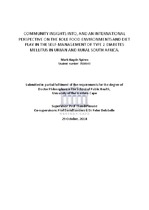| dc.contributor.advisor | Puoane, Thandi | |
| dc.contributor.author | Spires, Mark Haydn | |
| dc.date.accessioned | 2018-11-11T13:29:45Z | |
| dc.date.available | 2018-12-14T22:10:05Z | |
| dc.date.issued | 2018 | |
| dc.identifier.uri | http://hdl.handle.net/11394/6470 | |
| dc.description | Philosophiae Doctor - PhD | en_US |
| dc.description.abstract | Type 2 diabetes mellitus (T2DM) and pre-diabetes contribute increasingly to the global
burden of disease. Along with other behavioural risk factors, diet plays a key role in the
onset and management of the disease, in turn largely determined by what foods are
immediately accessible in local food environments.
With this in mind, this thesis aims to answer the research question: What role do local food
environments play in promoting or inhibiting access to healthy foods as part of the self -
management of T2DM in urban and rural communities in South Africa, and what can be
learned from an international perspective?
Specific research objectives include, to:
1. Understand the current national-level policy context with regard to the observed rise
in NCDs, their proximal determinants (specifically an observed change in diet
patterns), and contributing environmental factors;
2. Identify the current food-related environmental factors associated with the onset
and/or management of T2DM in an urban and a rural setting (as well as in four
additional international settings in order to provide an international perspective);
3. Explore community perspectives of the role the local food environment plays in the
self-management of T2DM in an urban and a rural setting; and, consequently
4. Recommend intervention- and/or policy-related actions that can be implemented
based on study findings. A review of the literature and relevant policies was conducted towards achieving the first
research objective. Quantitative data were systematically collected at an urban and rural
site in South Africa through the creation of an ‘environmental profile’ in an attempt to
achieve the second objective – comparable urban and rural data was also collected as part
of a larger study at two other international sites (Kampala, Uganda and Stockholm, Sweden)
to provide an international perspective. Included in the third objective is the collection of
qualitative data through a community based participatory research method at the same
urban and rural sites in South Africa. Finally, intervention and/or policy-related
recommendations are developed based on study findings and in consultation with relevant
stakeholders through interviews. | en_US |
| dc.language.iso | en | en_US |
| dc.publisher | The University of the Western Cpae | en_US |
| dc.subject | South Africa | en_US |
| dc.subject | Diabetes | en_US |
| dc.subject | Diabetes self-management | en_US |
| dc.subject | Nutrition transition | en_US |
| dc.subject | Food environment | en_US |
| dc.subject | Food access / food availability | en_US |
| dc.subject | Nutrition policy | en_US |
| dc.subject | Food environment mapping | en_US |
| dc.subject | Community based participatory research | en_US |
| dc.subject | PhotoVoice | en_US |
| dc.title | Community insights into, and an international perspective on the role food environments and diet play in the self-management of type 2 diabetes mellitus in urban and rural South Africa | en_US |
| dc.rights.holder | The University of the Western Cape | en_US |

